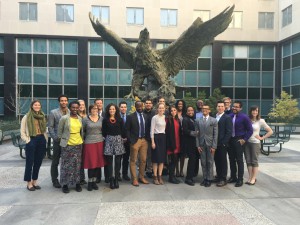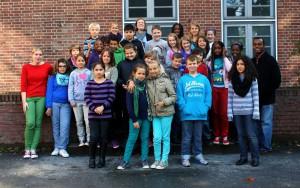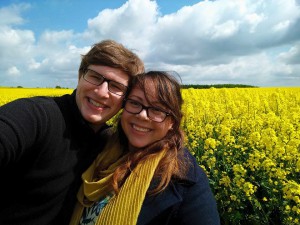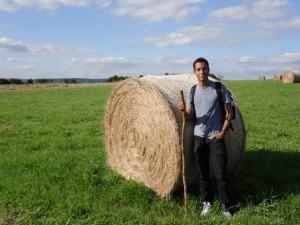
2016 Fulbright Alumni Ambassadors (from left to right, back row): Hanna Miller, Jonathan Rabb, Katelyn Leader, Alex Counts, Chane Corp, David Morales, Ryan Stock, Jilisa Milton, Mathieu Davis, Daniel Koehler; (left to right, front row) Mary Ogunrinde, Hannah Jones, Claire Manneh, Emmanuel Johnson, Christina Galardi, Evy Vourlides, Lauren Pitts, Alex Anderson, David Fleming, Rafael Camacho, Jr., and Emily Yedinak at the U.S. Department of State
On Thursday, December 10, 2015, 20 newly selected Fulbright U.S. Student Program Alumni Ambassadors met in Washington, DC to receive training on how to promote and recruit for the Fulbright U.S. Student Program. Staff members from the U.S. Department of State’s Bureau of Educational and Cultural Affairs (ECA) and the Institute of International Education (IIE), along with previous Fulbright Alumni Ambassadors, shared tips on effectively presenting the impact, innovativeness, and inclusiveness of Fulbright Program opportunities. The orientation workshop emphasized the unique and important role that Fulbright Alumni Ambassadors play in inspiring a diverse range of students, artists, and early career professionals – as well as the Fulbright Program Advisers and college administrators who support them – to learn more about the Fulbright Program and the power of educational and cultural exchange.
This year’s group was joined by notable Fulbright U.S. Student Program alumnus, Alex Counts (1988-1989, Bangladesh), Founder and past President and CEO of the Grameen Foundation, who shared how his Fulbright experiences continue to have an impact on his professional and non-professional life. Alex encouraged the 2016 Fulbright Alumni Ambassadors to share their Fulbright story and utilize the skills and cultural competencies they acquired as Fulbrighters with everyone they meet as representatives of the Program and beyond.
The Fulbright U.S. Student Alumni Ambassador Program was established in 2008 to identify, train and engage a select group of approximately 15-20 Fulbright U.S. Student Program alumni to serve as representatives, recruiters and spokespersons for the Fulbright Program. They are selected annually through recommendations from Fulbright Commissions, U.S. Embassy staff, area managers, and the Fulbright Student Program Outreach Division, and approved by the Fulbright Program’s sponsor, ECA. Fulbright Alumni Ambassadors come from an array of different ethnic and socio-economic backgrounds, states, fields of study, and institutions and have participated in the Fulbright U.S. Student Program in all world areas.
Continue Reading





